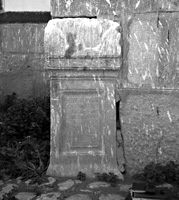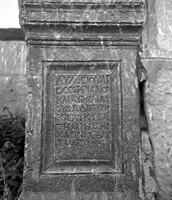 MAMA XI 258 (Laodikeia)
MAMA XI 258 (Laodikeia) 
Funerary bomos of Aulus Iulius Sergianus and Aurelia Douda
- Type of monument:
- Funerary bomos.
- Location:
- Ladık (Laodikeia): in the wall of the school.
- Description:
- Grey marble bomos, complete, buried below. Mouldings above and below; inscription in inset moulded panel on shaft.
- Dimensions:
- Ht. 1.33+; W. 0.62 (upper moulding), 0.54-0.56 (shaft), 0.67 (base); Th. 0.62 (upper moulding), 0.55 (shaft); letters 0.030-0.040.
- Record:
- AH notebook copy; photographs (1957/88=5935-6).
- Publication:
- None.
- Date:
- Second or third century AD.
Αὔλος Ἰούλι-
ος Σεργιανὸς
καὶ Αὐρηλίᾳ Δ-
ουδαδι γυνε-
5κὶ γλυκυτά-
τῃ μνήμης
χάριν κὲ ἑαυ-
τῷ ζῶν.
hed. hed.
Aulus Iulius Sergianus, and for his sweetest wife Aurelia Douda, in memoriam, and for himself, while he was still living.





The text of this inscription is a little garbled; I assume that the mason originally intended to inscribe ⟨ἑαυτῷ⟩ καὶ Αὐρηλίᾳ κτλ. in line 3, and on noticing his omission, added the phrase κὲ ἑαυτῷ in lines 7-8. Curiously, the mason of MAMA XI 260 (1957/111), also built into the wall of the school at Ladık, seems to have made exactly the same error. For the indigenous name Δουδη/Δουδα, which is extremely common across the western part of the plateau, see Zgusta 1964: 153 §306-1; MAMA XI 261 (1957/83: Nevine [Bahçesaray]); 260 (1957/111: Ladık); 348 (1956/198: Savatra).
The name Aulus Iulius Sergianus is of great interest. Sergii and Sergiani are widely attested across the central part of the plateau in the first two centuries AD, at Ladık (Eros son of Sergianus: MAMA I 108; Sergianus: Ramsay 1888: 246, no. 40); at the neighbouring village of Kindyria (Gaius Calpurnius Sergius: MAMA VII 14); and above all in the vicinity of Vetissos (Sergius Karpos and family: MAMA VII 321; L. Sergius Korinthos: MAMA VII 486; see also MAMA VII 330-1; Waelkens 1986: 239-40, nos. 616-7). All of these individuals were apparently connected with a large estate near Vetissos owned by the Sergii Paulli of Pisidian Antioch (MAMA VII 319; RECAM II 355; Mitchell 1993: I 151-2). Presumably Aulus Iulius Sergianus is the descendant of a freedman or freedwoman from this estate.
The combination ‘Aulus Iulius’ is striking and unusual. Another Aulus Iulius is attested at Ladık (A. Iulius Onesiphoros, MAMA I 47), and Auli Iulii are known at Ikonion, just to the south-east of Laodikeia (Aulus Iulius Hermes: SEG 6, 425; Aulus Iulius Philemon: SEG 6, 427), and at Derbe, in south-eastern Lykaonia (Aulus Iulius Hieronymos and Aulus Iulius Sestullianus: Laminger-Pascher 1992: 64, no. 59 [AD 156/7]; on the name Sestullianus, see the commentary to MAMA XI 142 [1955/75]). It seems very likely that in all of these cases we are dealing with freedmen of the great Pergamene aristocrat C. Antius Aulus Iulius Quadratus (PIR2 I 507; Halfmann 1979: 112-5; Sherk 1980: 1007-11). There is independent evidence that Quadratus had interests in this region. In the early third century AD, a large imperial estate known as the praedia Quadratiana is attested at Ladık (MAMA I 24, with Mitchell 1993: I 155-6; cf. I.Konya 6 [SEG 6, 407], a votive monument from Ikonion to Μητρὶ Κουαδατρηνῇ). This estate clearly once belonged to a private landowner by the name of Quadratus, and given the concentration of Auli Iulii in this region, it is reasonable to assume that C. Antius Aulus Iulius Quadratus is the landowner concerned (thus already Halfmann 1979: 114; contrast Mitchell 1993: I 155, who tentatively prefers C. Iulius Quadratus Bassus – but this would not explain the prevalence of the praenomen Aulus).
The name Aulus Iulius Sergianus ought therefore to result from the intermarriage of freedmen of two of the major landowning families on the central part of the plateau, the Sergii Paulli of Antioch and the Auli Iulii of Pergamon. The most economical hypothesis would be that his father was a freedman Aulus Iulius, and that his mother carried the gentilician Sergia.